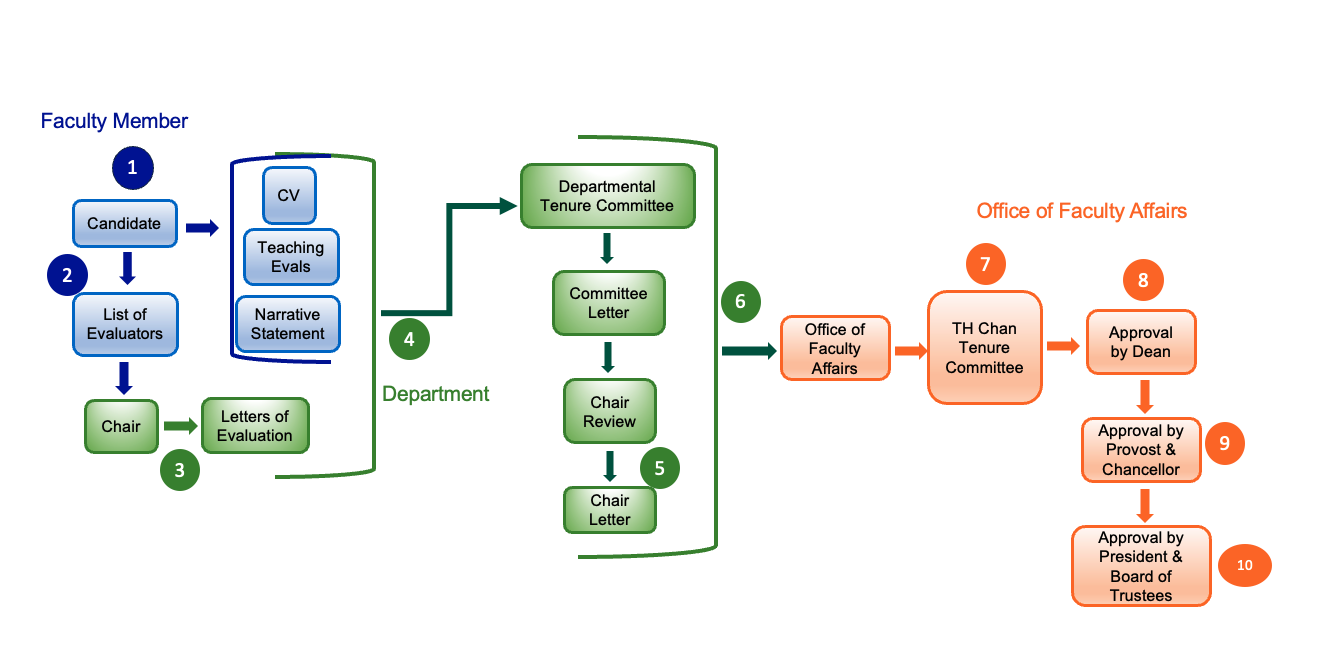Process for the Award of Tenure
A candidate to be reviewed for the award of tenure provides the following materials to their department to be included in their Tenure Dossier:
- a current Curriculum Vitae (in the UMass Chan Medical School format): see here for information on preparing a CV.
- evidence of Effectiveness in Educational Activities: see here for more information.
- an Narrative Statement that describes the candidate’s scholarly activities and future goals: see here for more information.
- up to five scholarly works that the candidate feels represent their best scholarship; and
- any other materials that the candidate believes are relevant for consideration.
The candidate also provides the following to their chair:
- a proposed list of individuals who will write Letters of Evaluation: see here for guidelines on letters of evaluation. At least five Category 2 letters are required and undefined numbers of Category 1 and Category 3 letters. The chair may add or subtract individuals as they deem appropriate but must include at least two individuals proposed by the candidate. The list of the individuals solicited for letters of reference is included in the candidate's Dossier.
- a proposed list of individuals to be considered as ad hoc reviewers on the School Tenure Committee. Individuals who write letters of evaluation cannot serve as ad hoc reviewers. The list should consist of the following:
- 2-3 proposed internal ad hoc reviewers who hold tenure at UMass Chan Medical School and do not hold a faculty appointment in the same department as the candidate; and
- 2-3 proposed external ad hoc reviewers who are not UMass Chan Medical School faculty and who hold tenure (or its equivalent) at their respective institution.
- the proposed internal and external ad hoc reviewers must also meet the following criteria:
- not a collaborator of the candidate;
- have an appropriate level of expertise in the candidate's field to assist in the evaluation process;
- able to provide unbiased assessments; and
- not included on the candidate’s proposed list of individuals to be solicited for letters of evaluation.
Download the Guidelines for Ad Hoc Reviewers
- an optional list, with a written justification, of individuals, including voting members of the School Tenure Committee, whom the candidate feels may have a real or perceived conflict of interest or bias in the evaluation of the candidate.

The steps involved in the tenure process are as follows (see flowchart above):
- The candidate provides the department with the materials listed above for their Tenure Dossier.
- The candidate provides the chair with proposed lists of evaluators and ad hoc reviewers.
- The chair selects the individuals to write letters of evaluation. The chair may add or subtract individuals from the candidate’s list but must include at least two individuals proposed by the candidate. The department solicits the letters of evaluation, which are added to the candidate's Dossier.
- The candidate's Dossier is reviewed by the Department Tenure Committee, which submits a letter of recommendation to the department chair; this letter is added to the candidate's file.
- The department chair writes a letter of recommendation, which is added to the candidate's file.
- The candidate’s Dossier is submitted to the Office of Faculty Affairs, where it is reviewed for completeness.
- The School Tenure Committee reviews the candidate's Dossier and makes a written recommendation for or against the award of Tenure.
- The T.H. Chan School of Medicine Dean reviews the candidate's Dossier and makes a written recommendation for or against the award of Tenure.
- The Provost & Chancellor reviews the candidate's Dossier and makes a written recommendation for or against the award of Tenure.
- The University President reviews the candidate’s Tenure Dossier and decides whether or not to award Tenure. The decision to award Tenure is made by the President with the concurrence of the Board of Trustees.